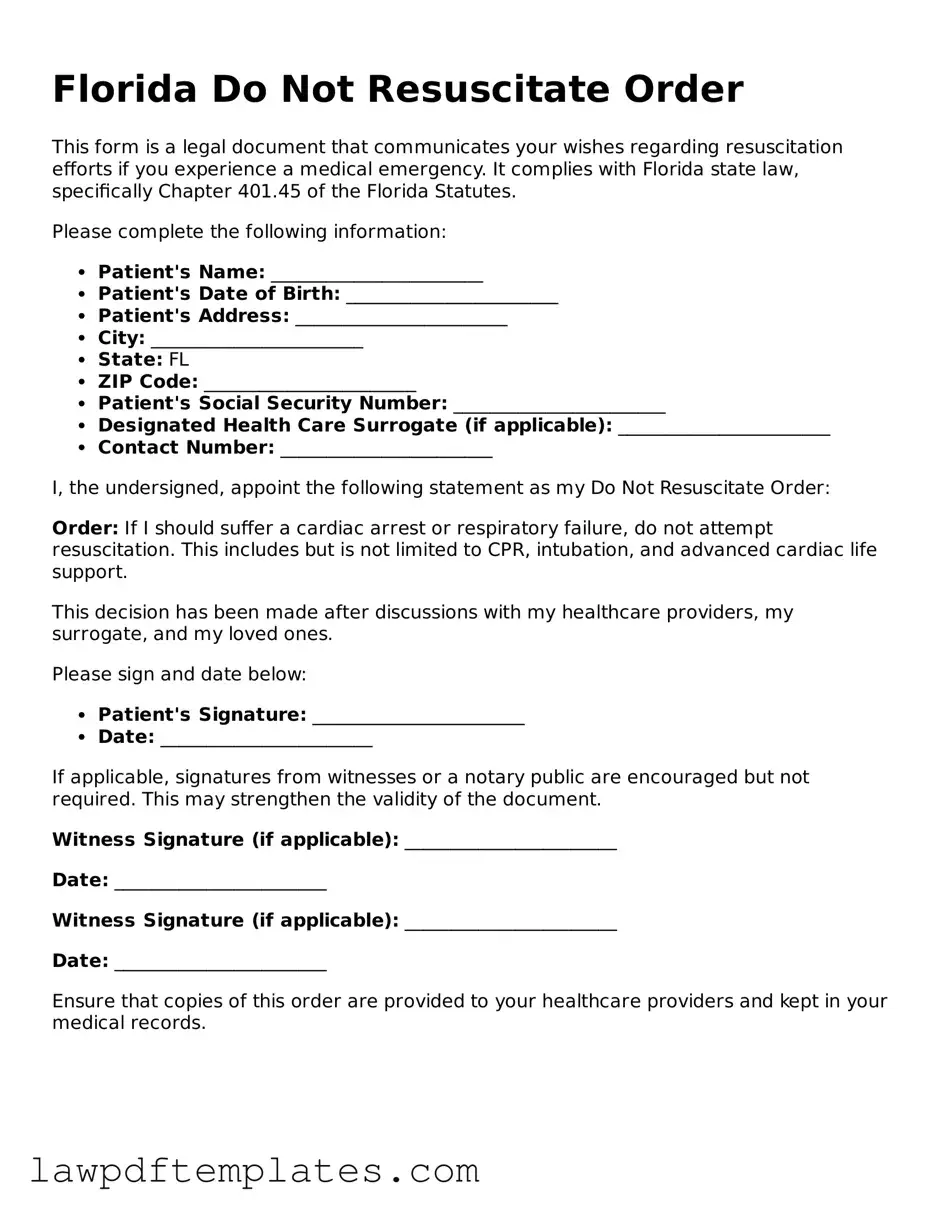Free Do Not Resuscitate Order Template for the State of Florida
Form Breakdown
| Fact Name | Description |
|---|---|
| Definition | The Florida Do Not Resuscitate Order (DNRO) form allows individuals to refuse resuscitation in case of cardiac or respiratory arrest. |
| Governing Law | The DNRO is governed by Florida Statutes, specifically Chapter 401.45. |
| Eligibility | Any adult can complete a DNRO, and it must be signed by a physician. |
| Signature Requirement | The form must be signed by the patient or their legal representative, along with a physician's signature. |
| Form Availability | The DNRO form is available through the Florida Department of Health and various healthcare providers. |
| Revocation | A DNRO can be revoked at any time by the patient or their legal representative, verbally or in writing. |
| Effectiveness | The DNRO is effective statewide and must be honored by all healthcare providers in Florida. |
| Additional Considerations | Patients should discuss their wishes with family members and healthcare providers to ensure understanding and compliance. |
Sample - Florida Do Not Resuscitate Order Form
Florida Do Not Resuscitate Order
This form is a legal document that communicates your wishes regarding resuscitation efforts if you experience a medical emergency. It complies with Florida state law, specifically Chapter 401.45 of the Florida Statutes.
Please complete the following information:
- Patient's Name: _______________________
- Patient's Date of Birth: _______________________
- Patient's Address: _______________________
- City: _______________________
- State: FL
- ZIP Code: _______________________
- Patient's Social Security Number: _______________________
- Designated Health Care Surrogate (if applicable): _______________________
- Contact Number: _______________________
I, the undersigned, appoint the following statement as my Do Not Resuscitate Order:
Order: If I should suffer a cardiac arrest or respiratory failure, do not attempt resuscitation. This includes but is not limited to CPR, intubation, and advanced cardiac life support.
This decision has been made after discussions with my healthcare providers, my surrogate, and my loved ones.
Please sign and date below:
- Patient's Signature: _______________________
- Date: _______________________
If applicable, signatures from witnesses or a notary public are encouraged but not required. This may strengthen the validity of the document.
Witness Signature (if applicable): _______________________
Date: _______________________
Witness Signature (if applicable): _______________________
Date: _______________________
Ensure that copies of this order are provided to your healthcare providers and kept in your medical records.
Common mistakes
Filling out a Florida Do Not Resuscitate Order (DNRO) form can be a daunting task, especially when emotions run high. Many individuals make mistakes that could lead to confusion or unintended consequences. Here are eight common errors to avoid.
One of the most frequent mistakes is not having the form signed by a physician. The DNRO must be signed by a licensed physician to be valid. Without this signature, healthcare providers may not honor the order, which can lead to unwanted resuscitation efforts.
Another common error is failing to clearly indicate the patient's wishes. The form must explicitly state that the patient does not want resuscitation. Ambiguities can create confusion for medical personnel, potentially resulting in actions contrary to the patient’s intent.
People often overlook the importance of updating the DNRO. Life circumstances change, and so do medical preferences. If a patient’s health status or wishes change, it’s crucial to revise the form accordingly. An outdated DNRO may not reflect the patient’s current desires.
Additionally, some individuals neglect to discuss their wishes with family members. Open conversations can prevent misunderstandings and ensure that loved ones are aware of the patient’s decisions. Without this dialogue, family members might be caught off guard in a medical crisis.
Another mistake involves not providing copies of the DNRO to all relevant parties. It’s essential to share the form with healthcare providers, family members, and anyone else involved in the patient’s care. This ensures that everyone is on the same page and can act according to the patient’s wishes.
Sometimes, people fill out the form without fully understanding its implications. The DNRO is a serious document that can affect end-of-life care. It’s important to consider the emotional and medical consequences before making a decision.
Moreover, some individuals forget to check the specific requirements of the DNRO in Florida. Each state has its own rules regarding these orders, and it’s crucial to follow Florida’s guidelines to ensure the form is legally binding.
Finally, failing to keep the DNRO in a readily accessible location can be a significant oversight. In an emergency, time is of the essence. Keeping the form in an easily accessible place can help ensure that healthcare providers can quickly find and honor the patient’s wishes.
Discover More Do Not Resuscitate Order Templates for Specific States
Dnr Directive - A Do Not Resuscitate Order represents an individual’s values and wishes regarding life and death.
Utilizing the Texas TREC Residential Contract form effectively can significantly enhance the real estate transaction process. It is essential to comprehend each section thoroughly to avoid potential pitfalls. For those unfamiliar with the process, resources are available to assist, such as https://texasformspdf.com/fillable-texas-trec-residential-contract-online/, which offers valuable insights and support for filling out the necessary documents.
Dnr Do Not Resuscitate - Designed for individuals who consider their quality of life in medical care situations.
Do Not Resuscitate Form Georgia - Advance directives, including DNR orders, are essential for proactive healthcare planning.
